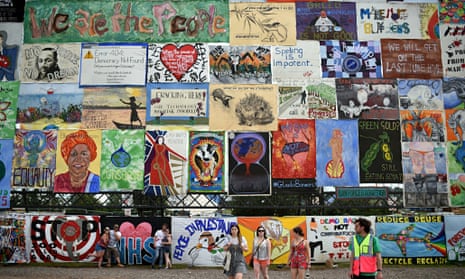At 10am on Saturday, I tweeted the details of that day’s debates at the Glastonbury festival’s Left Field: an event titled Feminism Without Borders and another discussion, described in the running order as New Frontiers!, featuring campaigners against fracking, the Transatlantic Trade and Investment Partnership (also known as the TTIP) and the war being waged on working-class London in the name of property development. Quick as a flash, there was one withering reply: “I thought people went to Glastonbury to get away from that stuff.”
When writing about this festival, you inevitably have to push through a great force-field of received opinion. Quiet apart from the idea of “Glasto” as some ephemeral, hedonistic bunfight, there are all those arguments about what has happened to its spirit over the past 10 or 15 years, usually phrased in the form of sneers. The festival has changed, but then so has the world. Walking around its seemingly infinite expanse and comparing it to the event I first attended, in 1990 – the last year before the organisers let the police in, when one could freely buy breakfast from a hash-cake salesman before meeting friends who had got in for nothing – feels like contrasting very different versions of the same thing. But so does comparing the Britain of now with the country that was about to say goodbye to Margaret Thatcher. Most worthwhile elements of our culture grow and develop, occasionally in ways some people do not like.
And in fact, Glastonbury – which, when I first came, was known as the Glastonbury CND festival – still has a radical, egalitarian spirit that can be picked up all over the site (the logos on your wristband, just to hammer the point home, are not those of beer companies, but of Greenpeace, WaterAid and Oxfam). This year, the first thing that came into view as you approached the Pyramid stage was a towering set of protest artworks built around a sculpture of a crab eating a missile, and the words “Scrap Trident”. And 10 minutes walk away, as usual, was the slightly misnamed Left Field: actually a giant tent, curated by that enduring Glastonbury icon Billy Bragg, in which the daytime is given over to debate and songwriters’ workshops, while the evening features full live sets with a political tilt. It has been here since 2002, and became known as the spiritual home of that proud English nonconformist Tony Benn, who made one of his last public appearances here in June 2013.
From Friday to Sunday, I chaired five of this year’s daytime debates. In retrospect, last year’s sessions were sometimes made uneasy and inconclusive by the prospect of a general election, and by people’s ambivalent feelings about the Labour party.
This time, the contributions from both platform and floor – or, rather, grass – felt newly unbound, and built on a set of questions – some of them agonised. To paraphrase: where do we go from here? What issues will define the next five years? And might the seemingly grim state of British politics be in any way improved?
Each debate drew at least a couple of hundred people, some three or four times that number. In most cases the majority of the crowd seemed to be under 30. Judging by their interest in the speakers from Syriza and Podemos, and the huge audience that gathered to watch me interview those estimable Russian feminists Pussy Riot, their politics tends to be internationalised and well informed. When the crowd in the tent heard from the Scottish activists Cat Boyd – of the Radical Independence Campaign – and Pat Kane, there was asense that Scotland’s political reformation has finally cut through in England, and at least some people are trying to learn from it.
When I straw-polled a 1,000-strong crowd at the closing debate, people fell 50-50 between Labour and the Greens, though the former party should take note: on the evidence of only one person asking a question about the leadership contest all weekend, it has not fired anyone’s imagination, and may well be making deeper problems even worse. Very quickly, it seemed to dissolve into irrelevance while a much more vivid story was revealed: the fact that at a time when it is too easy to fall into a vacant kind of despair, every session gave voice to a palpable sense of hope – difficult to articulate or even justify sometimes, but there nonetheless.
At the most packed sessions, the thought sprang to mind again and again: here was an identifiable political tribe cohering right in front of us. To somewhat selectively quote from Paul Mason’s Why It’s All Kicking Off Everywhere, a lot of the people who came to the Left Field echoed his description of the 21st century’s new breed of young activists as “a new sociological type ... They are not prone to traditional and endemic ideologies ... The common theme is dissolution of centralised power and the demand for ‘autonomy’ and personal freedom.” This last point rings very true: though some people still cleave to a politics that speaks the language of old-school socialism or class war (“Is it time for a general strike?” asked one hopeful attendee), even their views intersect with a larger tendency that puts a bigger emphasis on democracy and the need to fundamentally change broken political systems, along with an assertive kind of identity politics chiefly manifested in feminism.
In that context, that hackneyed old phrase “We are the 99%” feels now as much focused on representation as redistribution. Indeed, what many of these people have taken from recent events – and particularly the rise of Podemos in Spain – is that the latter will not occur without the former. One question about the need for proportional representation met with huge applause, and the issue came up again and again: proof that changing the voting system is no longer an issue for anoraks but the basis of a visceral collective wish for change. Bragg himself increasingly predicates his politics on accountability, and on reining in concentrations of power, corporate and political.
From to time, when the conversation became a little cliched, or the idea that the Tories were about to crumble into disarray was voiced a bit too loudly, the word “Nuneaton” passed through my mind, and I was reminded of how far the left – if we can still talk meaningfully about “the left” – has to go. But reasons for guarded optimism extended into the distance.
A five-minute, off-the-cuff speech by Charlotte Church proved that uncompromising resistance to just about everything the current government wants to do need not sound sour and shrill but could be empathetic and human. Shami Chakrabarti did a beautiful job of underlining the grave threat posed by what the government wants to do to our human rights. But perhaps the most impressive people were the activists who just told their stories: Jasmine Stone from Focus E15 Mothers; Zoe Blackwell, who came to Glastonbury from the Wirral, and talked about devoting all her spare time to fighting plans to frack the ground beneath her neighbourhood.
At the end of the aforementionedfeminism session, I went out into the crowd and chatted to Francesca Scanlon, an 18-year-old sixth former from Whitley Bay. This was not just her first Glastonbury but her first festival. “I think it’s brilliant,” she said, before telling me she had seen the Vaccines, the Courteeners and Florence + the Machine. But then she talked about the festival’s political aspect. “You get a real kind of leftwing, liberal feeling here,” she said. “It’s really free. Where I’m from isn’t like that: it’s quite right wing.” What came next underlined what old-school socialists would call fellowship: the feeling of being among like minds, and taking inspiration from them. “I feel at home,” she said.

